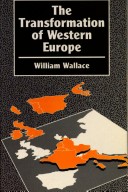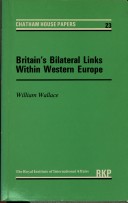Chatham House papers
2 total works
Western Europe has undergone dramatic changes in the 40 years since European integration was launched. The institutions set up in the postwar years - OEEC/OECD, the Council of Europe, NATO, WEU, above all the European Communities - have set the framework for relations among the West European governments since the 1950s. Yet the character of the European economy has been transformed by industrial integration and technical change. The revolution in communications has created a European society, moving across national borders and responding to shared information. The security umbrella provided by the Americans against the evident Soviet threat has become less central. This study looks at the interaction of political, security, economic and social developments since the European Communities were founded, notes the magnetic attraction of an integrating Western Europe for a widening circle of countries, and draws conclusions from these past trends for Europe's likely future development.

